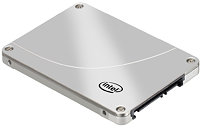Friday, July 15th 2011

Intel Acknowledges SSD 320 Series ''8 MB Bug''
Intel's 320 Series SSD is the silicon giant's big push of SSD technology into homes and offices. The SATA 3 Gb/s compatible 2.5" SSDs offer generally good price per gigabyte by SSD standards, and is even backed by a 5 year warranty after some customers were skeptical about the low NAND flash rewrite cycle capacity of the new 25 nm MLC NAND flash chips. Off late, several customers have been noting a bug in its firmware that drops capacity down to 8 MB, making data occupied on the rest of the capacity inaccessible. This bug came to be popularly known as the "8 MB bug".
Intel's Support Community boards have been piling up with complaints about this bug by users of 320 series. Then earlier this week, Intel's Non-Volatile Memory (NVM) Solutions Group acknowledged this bug. It asked customers to contactIntel representatives or Intel customer support, and said that it will provide an update when it has more information. In all likelihood, this is yet another case of buggy firmware by Intel, which haunted it through the 34 nm X25-M and some older SSDs.
Source:
TechSpot
Intel's Support Community boards have been piling up with complaints about this bug by users of 320 series. Then earlier this week, Intel's Non-Volatile Memory (NVM) Solutions Group acknowledged this bug. It asked customers to contactIntel representatives or Intel customer support, and said that it will provide an update when it has more information. In all likelihood, this is yet another case of buggy firmware by Intel, which haunted it through the 34 nm X25-M and some older SSDs.

32 Comments on Intel Acknowledges SSD 320 Series ''8 MB Bug''
Just because SSD B have similar problems does not justify for SSD A having such issues.Firmware are relatively small piece of software that can be thoroughly debugged, unlike large software such as Windows which are bound to have bugs.
its nowhere near as simple as you seem to think it is. shit, seagate had similar issues last year with their mechanical drives.
It is not easy, but by no means impossible with proper testing if company doesn't rush their products to the market.
(Almost every tech company rushes their products these days. Seagate being one of them.)
Nonetheless, I trust Intel's SSD over all other brands.
If you do your research, you will know that other brands have way higher failure rate compared to Intel
8/13 Update on "Bad Context 13x Error" for Intel SSD 320 Series
Quote from above link.:)
But this 8mb bug put a halt on that idea. Too bad, Intel is pretty reliable in the SSD dept.